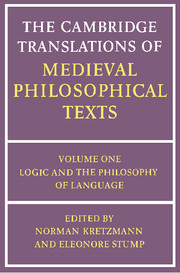Book contents
- Frontmatter
- Contents
- Preface
- General Introduction
- 1 BOETHIUS: On Division
- 2 Anonymous: Abbreviatio Montana
- 3 PETER OF SPAIN Predicables Categories
- 4 LAMBERT OF AUXERRE: Properties of Terms
- 5 Anonymous: Syncategoremata Monacensia
- 6 NICHOLAS OF PARIS: Syncategoremata (selections)
- 7 PETER OF SPAIN: Syllogisms; Topics; Fallacies (selections)
- 8 ROBERT KILWARDBY: The Nature of Logic; Dialectic and Demonstration
- 9 WALTER BURLEY: Consequences
- 10 WILLIAM OCKHAM: Modal Consequences
- 11 ALBERT OF SAXONY: Insolubles
- 12 WALTER BURLEY: Obligations (selections)
- 13 WILLIAM HEYTESBURY: The Compounded and Divided Senses
- 14 WILLIAM HEYTESBURY: The Verbs ‘Know’ and ‘Doubt’
- 15 BOETHIUS OF DACIA: The Sophisma ‘Every Man is of Necessity an Animal’
- Index
11 - ALBERT OF SAXONY: Insolubles
Published online by Cambridge University Press: 05 June 2012
- Frontmatter
- Contents
- Preface
- General Introduction
- 1 BOETHIUS: On Division
- 2 Anonymous: Abbreviatio Montana
- 3 PETER OF SPAIN Predicables Categories
- 4 LAMBERT OF AUXERRE: Properties of Terms
- 5 Anonymous: Syncategoremata Monacensia
- 6 NICHOLAS OF PARIS: Syncategoremata (selections)
- 7 PETER OF SPAIN: Syllogisms; Topics; Fallacies (selections)
- 8 ROBERT KILWARDBY: The Nature of Logic; Dialectic and Demonstration
- 9 WALTER BURLEY: Consequences
- 10 WILLIAM OCKHAM: Modal Consequences
- 11 ALBERT OF SAXONY: Insolubles
- 12 WALTER BURLEY: Obligations (selections)
- 13 WILLIAM HEYTESBURY: The Compounded and Divided Senses
- 14 WILLIAM HEYTESBURY: The Verbs ‘Know’ and ‘Doubt’
- 15 BOETHIUS OF DACIA: The Sophisma ‘Every Man is of Necessity an Animal’
- Index
Summary
Introduction
Albert of Saxony studied at the University of Paris, where he became a master of arts in 1351. Two years later he was made rector of the University; and when a university was established at Vienna in 1365, Albert was its first rector. Beginning in the next year, however, and continuing until his death in 1390, Albert was Bishop of Halberstadt and involved chiefly in political and church affairs. Apart from his mathematical and logical treatises, Albert's work consists almost entirely of question-commentaries on Aristotle's works. The selection below is taken from his textbook of logic, Perutilis logica.
Insolubles are certain sorts of self-referential sentences that give rise to paradoxes, called insoluble because of their prodigious difficulty. The best-known example of an insoluble is the so-called liar's paradox: ‘What I am saying now is false.’ The middle of the fourteenth century was the most productive period of medieval work on insolubles. One treatment of insolubles in favor at that time was to maintain that they are false just because they signify or imply both that they are true and that they are false. Albert's approach to insolubles belongs to this tradition.
The treatise begins with some general definitions and rules about modality, the nature of true propositions, and the signification of propositions. Included among these rules is the stipulation (‘the sixth thesis’) that every proposition signifying that it is true and that it is false is false.
- Type
- Chapter
- Information
- The Cambridge Translations of Medieval Philosophical Texts , pp. 337 - 368Publisher: Cambridge University PressPrint publication year: 1989
- 1
- Cited by



